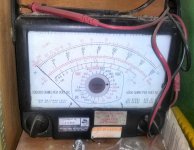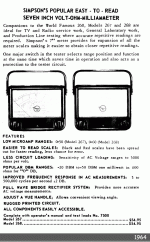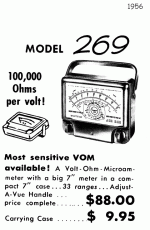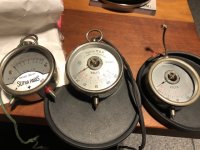I think that grouping ALL Fluke meters together is a mistake. Those Fluke 75 meters that you had trouble with were pretty much close to their bottom-of-the-line offerings, weren't they? Used higher-end Flukes would still be a good buy, I am thinking. My 8060A is still as good as new and I have certainly NOT 'babied' it.
Could check out this: https://www.amazon.com/EEVblog-BM786-Multimeter/dp/B08N61LF4Z
And the sneer implied in the quotation marks is intended to do what?
Secondly, didn't you report that your Fluke broke just few posts ago, in exactly the way I described, because of brittle plastic parts? Your own experience corroborates mine, not contradicts it.
Perhaps your lack of sufficient experience with large numbers of Fluke meters is the reason why you never saw these types of failures? It seems your profession only put you into contact with a few Flukes, while mine put me in contact with a lot more.
-Gnobuddy
Above edited for its way-too-long post.
Your attitude comes across as harsh, domineering, and combative.
Sounding, insisting, like YOU are never wrong, and that I am, for whatever reasons you believe.
And I'm certainly not about to play back-and-forth sword fights with you, or anyone else.
Nor do your bible-long posts about honda's and such interest me.
You assume I have a "lack" of experience... wrong there, 45 years in the business, and I claim I pretty much know things by now.
You also assume my meter has brittle plastic... it doesn't, it's still pliable 30 years later.
Just because the stop nub was weakened by forceful "off" operation of the knob, and not brittleness, you have to contradict my earlier story.
I can't believe some of what I am reading!
I am a Journeyman Test equipment repair and calibration technician. This subject I know cold.
Buying a new, good meter is an excellent plan. They will last for decades if treated well. I still have Fluke 85, 87 and others, and they are fine. I also have HP 974A and those are still in tolerance. I have new higher end Keysight meters and they are wonderful. I also have had HP 34401A meters, and recently bought 34465A and 34461A. Excellent value and extremely accurate.
Now the cheap meters ... Brands other than Fluke and Keysight typically do not use monolithic input divider networks. This is critical for HF response and long term calibration. Plus the elements track temperature. Most other meters have trouble meeting their rather loose specs out of the box. They often drift out of calibration. They also don't track range to range and can't be calibrate at times. The cheap meters are often way out of tolerance right out of the box.
Why one earth would you trust something like that. Not many people even test the calibration of their meters. they don't know the error budgets on various ranges and blindly read off every digit. A lot of meters shouldn't even have their least significant digits if you calculate their accuracy! At least when we used pointer type meters, we knew enough to say "about" in front of the reading we got. 2% was the average accuracy of a good meter back then.
Another concern is that we often read voltages in the mV range. People, most cheap meters are not capable of those measurements, never mind accurate ones. That means you cannot set bias currents in most solid state amplifiers.
You don't have to spend $600 on a meter unless you need the accuracy, but if you can it is a better meter and will hold calibration for decades in most cases. But $250 or so is a perfectly reasonable amount to spend. Don't use a good meter outside in the mud, but check it against your other good meter often to make sure it isn't lying to you. For accurate AC measurements at frequencies much above 60 Hz, you will be closer to $300 or so. This is a fact of life.
The typical response will be, "I don't need that good a meter", then that person will turn around and quote exact readings and depend on it. Make any sense to you?
-Chris
I am a Journeyman Test equipment repair and calibration technician. This subject I know cold.
Buying a new, good meter is an excellent plan. They will last for decades if treated well. I still have Fluke 85, 87 and others, and they are fine. I also have HP 974A and those are still in tolerance. I have new higher end Keysight meters and they are wonderful. I also have had HP 34401A meters, and recently bought 34465A and 34461A. Excellent value and extremely accurate.
Now the cheap meters ... Brands other than Fluke and Keysight typically do not use monolithic input divider networks. This is critical for HF response and long term calibration. Plus the elements track temperature. Most other meters have trouble meeting their rather loose specs out of the box. They often drift out of calibration. They also don't track range to range and can't be calibrate at times. The cheap meters are often way out of tolerance right out of the box.
Why one earth would you trust something like that. Not many people even test the calibration of their meters. they don't know the error budgets on various ranges and blindly read off every digit. A lot of meters shouldn't even have their least significant digits if you calculate their accuracy! At least when we used pointer type meters, we knew enough to say "about" in front of the reading we got. 2% was the average accuracy of a good meter back then.
Another concern is that we often read voltages in the mV range. People, most cheap meters are not capable of those measurements, never mind accurate ones. That means you cannot set bias currents in most solid state amplifiers.
You don't have to spend $600 on a meter unless you need the accuracy, but if you can it is a better meter and will hold calibration for decades in most cases. But $250 or so is a perfectly reasonable amount to spend. Don't use a good meter outside in the mud, but check it against your other good meter often to make sure it isn't lying to you. For accurate AC measurements at frequencies much above 60 Hz, you will be closer to $300 or so. This is a fact of life.
The typical response will be, "I don't need that good a meter", then that person will turn around and quote exact readings and depend on it. Make any sense to you?
-Chris
I mold plastics for a living.
One thing is that failures after say 10 years are hard to pin down to any particular event.
The second is that the evolution of plastic alloys and compounding was goaded by the automobile industry, as the cars had to lose weight, and be recyclable at the end of life.
Material handling techniques also had to improve in the plants, pre drying standards meant some materials had to be dried to - 40 degrees dew point. Normal is - 10, with air circulation, - 40 means dessicant bed driers. Much more difficult to achieve, usually not needed.
It could simply be that those meters were designed and specified for material by people whose knowledge of plastics was poor, not surprising as that happened to me in engineering school.
If you find the information, the meters were designed before 1985 or so, it was after that the use of plastics, particularly under the hood in intake manifolds and so on, started becoming common. Heat and oil are common under the hood, and long lives are expected.
So, if your business depends on it, buy a Fluke or another meter with the input networks, if not buy the best you can afford.
Nobody answered about Sanwa, the Japanese ones were well made inside, mechanical switch on a cheap needle meter, but that was decades ago.
One thing is that failures after say 10 years are hard to pin down to any particular event.
The second is that the evolution of plastic alloys and compounding was goaded by the automobile industry, as the cars had to lose weight, and be recyclable at the end of life.
Material handling techniques also had to improve in the plants, pre drying standards meant some materials had to be dried to - 40 degrees dew point. Normal is - 10, with air circulation, - 40 means dessicant bed driers. Much more difficult to achieve, usually not needed.
It could simply be that those meters were designed and specified for material by people whose knowledge of plastics was poor, not surprising as that happened to me in engineering school.
If you find the information, the meters were designed before 1985 or so, it was after that the use of plastics, particularly under the hood in intake manifolds and so on, started becoming common. Heat and oil are common under the hood, and long lives are expected.
So, if your business depends on it, buy a Fluke or another meter with the input networks, if not buy the best you can afford.
Nobody answered about Sanwa, the Japanese ones were well made inside, mechanical switch on a cheap needle meter, but that was decades ago.
Last edited:
Now those are VERY old Fluke meters. I think these were already around in 1991. That makes them 30 years old. That is an age other brands rarely reach....
I think all Flukes are young. Mine is hardly 30, got dropped off a ladder, got dipped in a can of varnish, blew fuses twice, still works good.
It's got nothing on my Simpson 269 (except sensitivity on the <100V ranges). It's probably from around 1970. All works fine except I won't throw $23 for a 22V battery for high-Ohms. I know why it was in Cos Cob Conn but I can't spill IMC secrets. Yes, the switching is chain-driven, and that is a 16uA meter movement. Yes, I have been letting it sit a while.
No, I did not buy it to use, I rescued it from trash. I use it occasionally, because I no longer value precision (and I have 3 other meters in my voting pool).
Yes, Fluke started in 1953 but the *famous* Flukes are the 1980s DMMs.
Attachments
Last edited:
If you open them up, the circuits are around the same bought out chips, Intersil 7106/7107, and similar.
The difference is in the quality of the rest of the components, the housing, switch, display quality and so on.
Fluke helped with the initial design of that chip. Intersil made a few changes and has been selling for the last 30+ years.
Some features are useful, like frequency, dB, relative but the cap and transistor test are not good enough in a combo meter to obviate a dedicated tester.
@PRR: these have no plastic to worry about.... Some of those are 100 years old. All of them still work.
Anecdote: just for fun I reused a 1926 quicksilver tube battery charger for charging Iphones but the project failed due to too slow ramp up time of the voltage
Anecdote: just for fun I reused a 1926 quicksilver tube battery charger for charging Iphones but the project failed due to too slow ramp up time of the voltage
Attachments
Last edited:
OldTech, your attempts at mind-reading have failed completely, as all attempts at mind-reading inevitably do. You are completely wrong about every single part of your post which I have quoted above.Your attitude comes across as harsh, domineering, and combative.
Sounding, insisting, like YOU are never wrong, and that I am, for whatever reasons you believe.
You are also putting words in my mouth, that I never said (or rather, wrote). That's your problem, not mine.
I am not going to waste any more of my time on this. Enjoy your ancient Fluke meters. May they stay as supple as a lamb in the spring time for the rest of your life, and not turn brittle and crumble away as so many do. May your supple Flukes improve your state of mind, so you are as happy as those lambs, instead of looking for insults were there are none.
For the rest of us, 16 of the original old 40 Fluke 75s in my care failed and were sent to recycling, either due to breakage of the external housing, or of the rotary switch, or both. That is a 40% failure rate, at the end of decades of good service.
As stated many times, they are excellent meters, and provided more service life than any reasonable person can expect.
As also stated many times, they are neither bulletproof nor immortal. Once old enough, they fail, like any other manufactured product. They are unlikely to last you a lifetime, whatever the odd old technician may say to the contrary.
And the message that has been overshadowed by the Methuselah-Fluke myth: plenty of meters that cost far less than a Fluke will provide everything the OP needs for his purposes.
-Gnobuddy
Hi Gnobuddy,
I agree with most of your core message above.
However with the cost of a good Fluke or Keysight being $200 ~ 300 Canadian, I can't recommend a cheap meter to anyone unless it is a secondary meter. You need at least one you can depend on or use if you have any doubts as to your reading.
The reason is simple. I have not met anyone who owns only a cheap meter that doesn't understand how inaccurate they can be. The last digit is often pointless and yet is quoted in a reading every time. People with better equipment tend to understand the limitations better.
You're going to own a meter for decades if it is half decent and nothing bad happens to it. It's also true that good meters often survive mistakes better than cheap ones do. The best hand held meters typically run over $600, and most people do not require those. So okay, but at least buy something you can depend on for that time. For sure no one sends cheap meters in for calibration periodically, and they need it the most.
Test equipment can lie to you if you just blindly accept the answer in the display. It is up to you to know what the limits and characteristics of your meter are. The better meters do tend to give you the tools to get a true reading. Most of all, read the darned manual for it occasionally.
-Chris
I agree with most of your core message above.
However with the cost of a good Fluke or Keysight being $200 ~ 300 Canadian, I can't recommend a cheap meter to anyone unless it is a secondary meter. You need at least one you can depend on or use if you have any doubts as to your reading.
The reason is simple. I have not met anyone who owns only a cheap meter that doesn't understand how inaccurate they can be. The last digit is often pointless and yet is quoted in a reading every time. People with better equipment tend to understand the limitations better.
You're going to own a meter for decades if it is half decent and nothing bad happens to it. It's also true that good meters often survive mistakes better than cheap ones do. The best hand held meters typically run over $600, and most people do not require those. So okay, but at least buy something you can depend on for that time. For sure no one sends cheap meters in for calibration periodically, and they need it the most.
Test equipment can lie to you if you just blindly accept the answer in the display. It is up to you to know what the limits and characteristics of your meter are. The better meters do tend to give you the tools to get a true reading. Most of all, read the darned manual for it occasionally.
-Chris
OldTech, your attempts at mind-reading have failed completely, as all attempts at mind-reading inevitably do. You are completely wrong about every single part of your post which I have quoted above.
You are also putting words in my mouth, that I never said (or rather, wrote). That's your problem, not mine.
I am not going to waste any more of my time on this.
And neither am I, except for One Last post....
You obviously have a demand for having The Last Word, and the condescending attitude towards me isn't attractive, nor would it be towards others.
As for mind-reading, look at your own statements about assuming what I know or don't know. - that's called projection.
If you insist on being argumentave, and that's your problem, not mine.
And with that, I'm done, and heading to the "Ignore User" list to add yet another name.....
I was thinking of something like this: https://uk.farnell.com/tenma/72-7730a/multimeter-dig-hand-held-19999/dp/2100035
With 1KVA, true rms, but also mF capacitance and 20k count. Tenma meting a known corp too.
I don't know that brand, but for excellent value for money and quality, pick one.
Brymen
Temna are Japanese and make power transformers etc. (Founded 1949)
However that 500,000 count is nice given the number of digits it maintains!
Last edited:
Nice review of the Bremen: Brymen BM789 DMM - YouTube watch the voltage testing ..and the HT oscilloscope probe. No messing about.
I got my Fluke 77 meter 35 years ago. It's served me well ever since. I've dropped it off lighting rigs and scaffolding, blown fuses in it and had to replace one of the probes last year (with a cheap Amazon knock off replacement which doesn't fit very well and I need to replace with a proper one) as the metal end snapped off the end. I am quite sentimental about it...quite strangely. There are a few other tools I've had as long but none are in quite such good shape. It broke the bank when I bought it and I only went for it because an older colleague recommended it. Looking back, it's paid for itself countless times. Can't recommend highly enough.
Pasteboard - Uploaded Image
Pasteboard - Uploaded Image
I got my Fluke 77 meter 35 years ago. It's served me well ever since. I've dropped it off lighting rigs and scaffolding, blown fuses in it and had to replace one of the probes last year (with a cheap Amazon knock off replacement which doesn't fit very well and I need to replace with a proper one) as the metal end snapped off the end. I am quite sentimental about it...quite strangely. There are a few other tools I've had as long but none are in quite such good shape. It broke the bank when I bought it and I only went for it because an older colleague recommended it. Looking back, it's paid for itself countless times. Can't recommend highly enough.
Pasteboard - Uploaded Image
Yep, my "77" is about 30 years old too, tossed around, and still a reliable old workhorse.
- Home
- Design & Build
- Equipment & Tools
- Should I get a Fluke or a cheaper multimeter?



